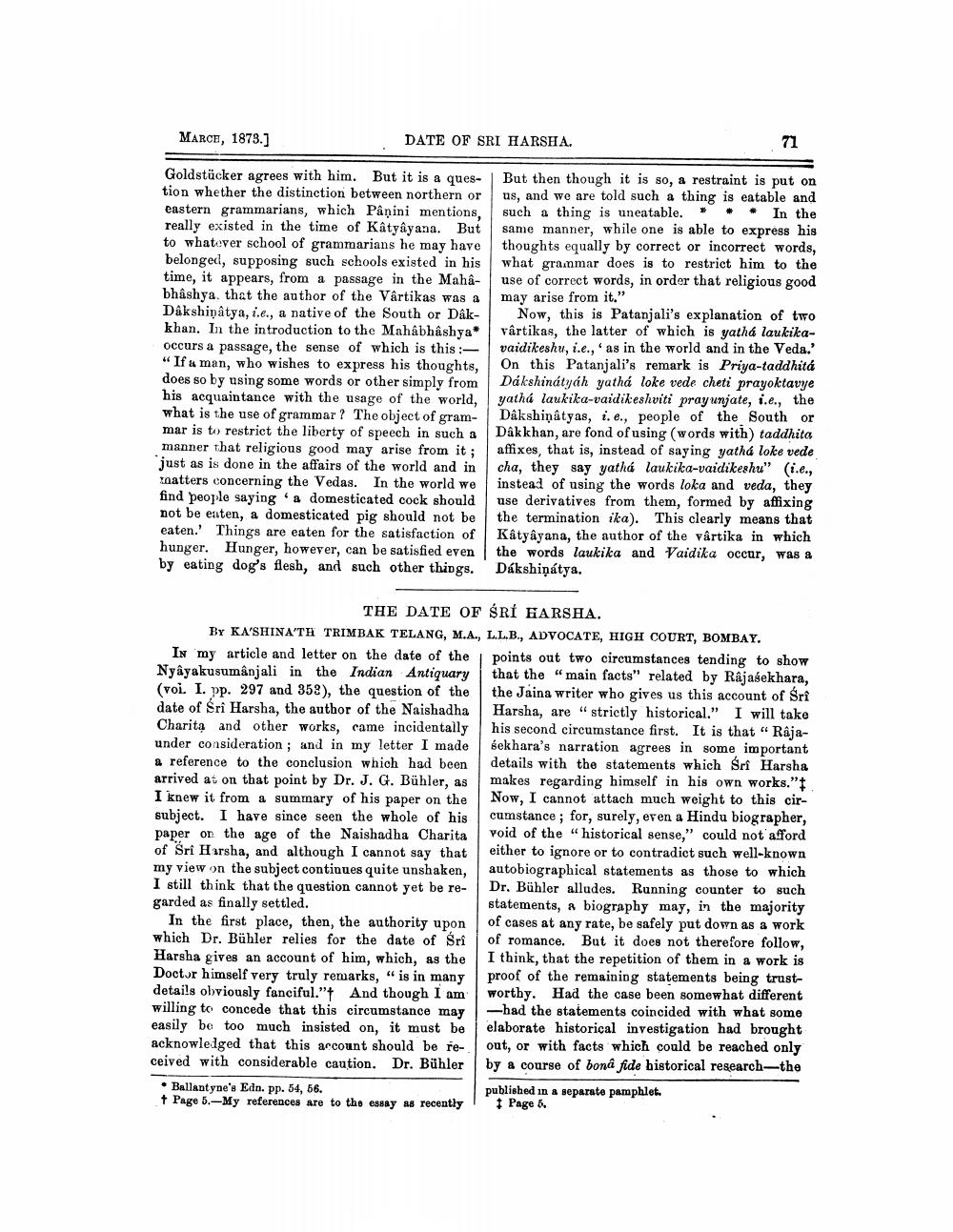________________
MARCE, 1873.)
DATE OF SRI HARSHA.
Goldstücker agrees with him. But it is a ques. tion whether the distinction between northern or castern grammarians, which Pâņini mentions, really existed in the time of Katyayana. But to whatever school of grammarians he may have belonged, supposing such schools existed in his time, it appears, from a passage in the Mahabhashya, that the author of the Vârtikas was a Dakshiņâtya, i.e., a native of the South or Dakkhan. In the introduction to the Mahâbhâshya* occurs a passage, the sense of which is this :"If a man, who wishes to express his thoughts, does so by using some words or other simply from his acquaintance with the usage of the world, what is the use of grammar? The object of grammar is to restrict the liberty of speech in such a manner that religious good may arise from it; just as is done in the affairs of the world and in zoatters concerning the Vedas. In the world we find people saying 'a domesticated cock should not be enten, a domesticated pig should not be eaten.' Things are eaten for the satisfaction of hunger. Hunger, however, can be satisfied even by eating dog's flesh, and such other things.
But then though it is so, a restraint is put on us, and we are told such a thing is eatable and such a thing is uneatable. * . . In the same manner, while one is able to express his thoughts equally by correct or incorrect words, what grammar does is to restrict him to the use of correct words, in order that religious good may arise from it."
Now, this is Patanjali's explanation of two vârtikas, the latter of which is yathá laukikavaidikeshu, i.e., 'as in the world and in the Veda.' On this Patanjali's remark is Priya-taddhitá Dákshinátyáh yathá loke vede cheti prayoktavye yatha laukika-vaidikeshviti prayunjate, i.e., the Dakshinatyas, i.e., people of the South or Dakkhan, are fond of using (words wit affixes, that is, instead of saying yathá loke vede cha, they say yathá laukika-vaidikeshu" (i.e., instead of using the words loka and veda, they use derivatives from them, formed by affixing the termination ika). This clearly means that Kâtyâyana, the author of the vârtika in which the words laukika and Vaidika occur, was & Dákshiņátya,
THE DATE OF SRÍ EARSHA. BY KASHINATH TRIMBAK TELANG, M.A., LLB., ADVOCATE, HIGH COURT, BOMBAY. In my article and letter on the date of the points out two circumstances tending to show Nyâyakusumânjali in the Indian Antiquary that the main facts" related by Rajasekhara, (voi. I. pp. 297 and 358), the question of the the Jaina writer who gives us this account of Sri date of Sri Harsha, the author of the Naishadha Harsha, are strictly historical." I will take Charita and other works, came incidentally his second circumstance first. It is that " Rajaunder consideration; and in my letter I made sekhara's narration agrees in some important a reference to the conclusion which had been details with the statements which Sri Harsha arrived at on that point by Dr. J. G. Bühler, as makes regarding himself in his own works." I knew it from a summary of his paper on the Now, I cannot attach much weight to this cirsubject. I have since seen the whole of his cumstance; for, surely, even a Hindu biographer, paper on the age of the Naishadha Charita void of the "historical sense," could not afford of Sri Harsha, and although I cannot say that either to ignore or to contradict such well-known my view on the subject continues quite unshaken, autobiographical statements as those to which I still think that the question cannot yet be re- Dr. Bühler alludes. Running counter to such garded as finally settled.
statements, a biography may, in the majority In the first place, then, the authority upon of cases at any rate, be safely put down as a work which Dr. Bühler relies for the date of Sri of romance. But it does not therefore follow, Harsha gives an account of him, which, as the I think, that the repetition of them in a work is Doctor himself very truly remarks, " is in many | proof of the remaining statements being trustdetails obviously fanciful.”+ And though I am worthy. Had the case been somewhat different willing to concede that this circumstance may -had the statements coincided with what some easily be too much insisted on, it must be elaborate historical investigation had brought acknowledged that this account should be re- out, or with facts which could be reached only ceived with considerable caution. Dr. Bühler by a course of bona fide historical research-the • Ballantyne's Edn. pp. 54, 56.
published in a separate pamphlet. Page 5.-My references are to the essay as recently Page 6




